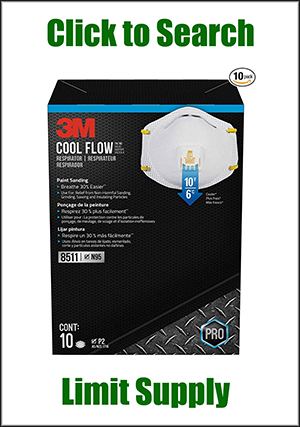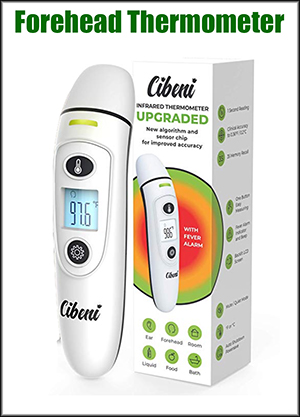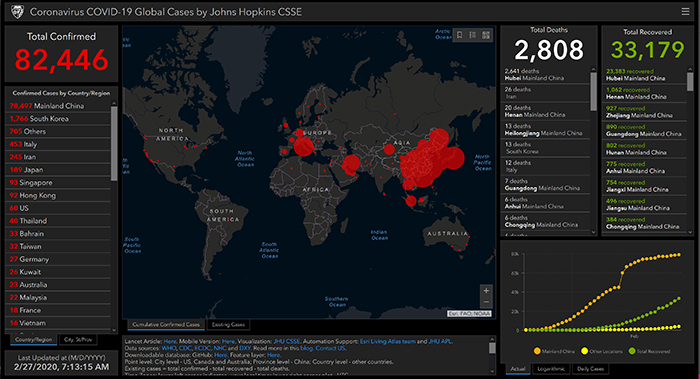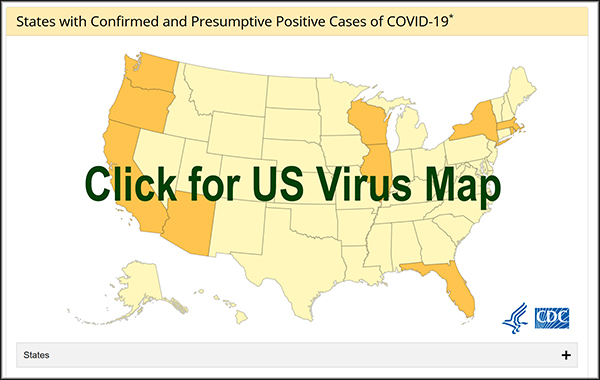How to Prepare for the Coronavirus
Preparing for the Coronavirus is unlike any preparation you have done in the past. In this video Doc will explain that preparation includes a lifestyle change as well as looking at your household, business, behaviors, and supplies. Unlike a hurricane, ice storm, or weather event, the coronavirus will be with us for potentially years to come. Preparing and preparation for the coronavirus requires LIFESTYLE and BEHAVIOR changes. Not just stocking up on supplies.
“The only people that PANIC in an emergency, are those that failed to follow common sense and PLAN ahead… when there was plenty of time to get ready.”
Preparation Tips and Info
Reducing the NUMBER of trips to public places and limiting your EXPOSURE is one VITAL element. PREPARE and think a little. In the event that your household, or the adults, get ill… have enough food and supplies for at least 30 days, if not 60.
- Stop the 5 times a week grocery store habit. Learn how to shop twice a month.
- Shop during low traffic hours. Have you ever been in a Walmart at 5am? It’s actually a nice place.
- Have everyone in the house make a list of things they need for the month. Get the family involved.
- Lay down some mandatory EXPOSURE RULES. Who is allowed to go where.
- Be prepared to work at home or even have at home school plans ready.
If the head of household gets ill, it’s critical that a 30 – 60 day supply of food is present. This “back up” supply should not be considered for daily usage.
The long term storage food below is
EXCELLENT quality and lasts 25 years.
Coronavirus Masks
Why are masks important? I think 100% of households should have them for the event that someone in the house gets ill. Both the person with the virus should wear one and the people caring for them should wear one. While everyone is saying NOT to buy them, I will say YES… you should have some at home for the home care of ill people.
The only masks that will really STOP a virus size particels are the N95 masks listed below. Warning: they have been sold out for days now.
Protective Gloves
Forehead Thermometer
Quick and easy way to test members of the family and even workers. Note: not all those infected with the coronavirus show symptoms including a fever. NOT having a fever does NOT mean someone is NOT infected.
Pocket Wipes
Great tip! These are EXCELLENT pocket wipes.
These are 100% isopropyl alcohol wipes, and while sold as glass cleaners they are EXCELLENT for hands and surfaces.
Changing behaviors will impact business.
Ask yourself these questions… if the coronavirus is present would you… or let your children do the following?
- Fly on a plane
- Ride on a public bus / transportation
- Go to a movie theater
- Work out at a gym
- Dine out in restaurants
- Go to large venues like sporting events
- Go shopping at a large mall
- Attend church
- Attend school with known cases in the area.
My guess is that ANY of these activities would cause you to fear transmission and rightly so.
What WOULD you do?
- Order delivery foods (immediately discarding packaging)
- Work in the yard. Great lawns.
- Plant a vegetable garden
- Go fishing – camping – hiking – hunting
- Stay home and watch streaming channels and movies.
- Hobbies and crafts
CoronaVirus Prevention
Wash your hands 20 times a day? Washing your hands more often is one of top ways to prevent exposure.
Stop touching your face? The virus is mostly transmitted via your mouth, nose, eyes, and lungs. Keeping virus spores away from these areas is mission #1.
Use self checkout, the cashier is exposed to 1000’s of people a day. Handle your own groceries and use bio wipes every time you leave the store.
Reduce “social exposure” as much as possible and maintain 6-10 feet from other people.
Be prepared for work and school closures. Have home study and entertainment items ready for kids and work related equipment ready. (web based programs etc)
If someone falls ill in your household, they should be restricted to ONE ROOM. Avoid letting ill people from wandering around the house touching all surfaces. Bring them whatever they need and try not to share bathrooms. Caregivers to this person should wear gloves and masks.
Do NOT allow outside friends and family members to enter a home where an ill patient is residing. The URGE to help is a wonderful human trait… but can be deadly for older family members. Allow friends and family to shop for you and get supplies, but DO NOT allow them in the house.
Coronavirus Live Map
The map below is the best we have found.
Corona Virus US Map
Corona Virus vs. Influenza Mortality Rates
We hear this argument a lot but it does not make sense. Coronavirus is much more serious. Math is a simple process so use it.
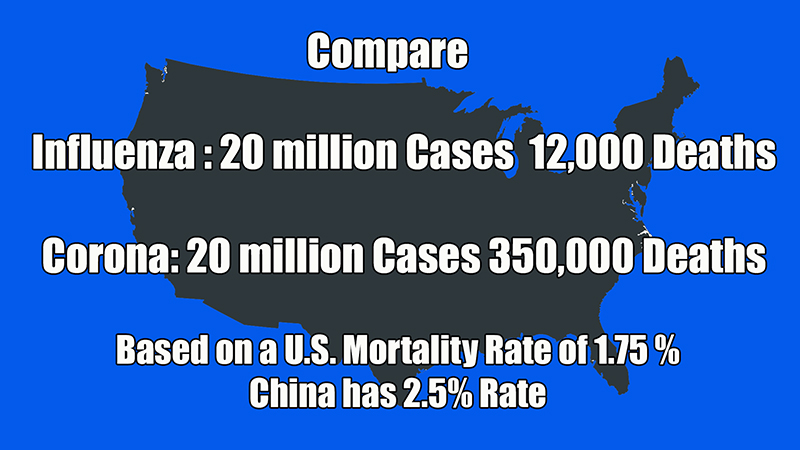
Corona Virus Symptoms – CDC
For confirmed coronavirus disease 2019 (COVID-19) cases, reported illnesses have ranged from mild symptoms to severe illness and death. Symptoms can include:
Fever
Cough
Shortness of breath
CDC believes at this time that symptoms of COVID-19 may appear in as few as 2 days or as long as 14 days after exposure. This is based on what has been seen previously as the incubation period of MERS-CoV viruses.
Coronavirus Prevention – CDC
There is currently no vaccine to prevent coronavirus disease 2019 (COVID-19). The best way to prevent illness is to avoid being exposed to this virus. However, as a reminder, CDC always recommends everyday preventive actions to help prevent the spread of respiratory diseases, including:
- Avoid close contact with people who are sick.
- Avoid touching your eyes, nose, and mouth.
- Stay home when you are sick.
- Cover your cough or sneeze with a tissue, then throw the tissue in the trash.
- Clean and disinfect frequently touched objects and surfaces using a regular household cleaning spray or wipe.
- Follow CDC’s recommendations for using a facemask.
- CDC does not recommend that people who are well wear a facemask to protect themselves from respiratory diseases, including COVID-19.
- Facemasks should be used by people who show symptoms of COVID-19 to help prevent the spread of the disease to others. The use of facemasks is also crucial for health workers and people who are taking care of someone in close settings (at home or in a health care facility).
- Wash your hands often with soap and water for at least 20 seconds, especially after going to the bathroom; before eating; and after blowing your nose, coughing, or sneezing.
- If soap and water are not readily available, use an alcohol-based hand sanitizer with at least 60% alcohol. Always wash hands with soap and water if hands are visibly dirty.
How Coronavirus Spreads – CDC
Current understanding about how the virus that causes coronavirus disease 2019 (COVID-19) spreads is largely based on what is known about similar coronaviruses.
Person-to-person spread
The virus is thought to spread mainly from person-to-person.
- Between people who are in close contact with one another (within about 6 feet)
- Via respiratory droplets produced when an infected person coughs or sneezes.
- These droplets can land in the mouths or noses of people who are nearby or possibly be inhaled into the lungs.
Spread from contact with infected surfaces or objects
It may be possible that a person can get COVID-19 by touching a surface or object that has the virus on it and then touching their own mouth, nose, or possibly their eyes, but this is not thought to be the main way the virus spreads.
When does spread happen?
- People are thought to be most contagious when they are most symptomatic (the sickest).
- Some spread might be possible before people show symptoms; there have been reports of this with this new coronavirus, but this is not thought to be the main way the virus spreads.
How efficiently does the virus spread?
How easily a virus spreads from person-to-person can vary. Some viruses are highly contagious (like measles), while other viruses are less so. Another factor is whether the spread continues over multiple generations of people (if spread is sustained). The virus that causes COVID-19 seems to be spreading easily and sustainably in Hubei province and other parts of China. In the United States, spread from person-to-person has occurred only among a few close contacts and has not spread any further to date.
There is still more to be learned
COVID-19 is an emerging disease and there is more to learn about its transmissibility, severity, and other features and what will happen in the United States. New information will further inform the risk assessment.
Preventing the Spread if Ill
Steps to help prevent the spread of COVID-19 if you are sick
If you are sick with COVID-19 or suspect you are infected with the virus that causes COVID-19, follow the steps below to help prevent the disease from spreading to people in your home and community.
Stay home except to get medical care
You should restrict activities outside your home, except for getting medical care. Do not go to work, school, or public areas. Avoid using public transportation, ride-sharing, or taxis.
Separate yourself from other people and animals in your home
People: As much as possible, you should stay in a specific room and away from other people in your home. Also, you should use a separate bathroom, if available.
Animals: You should restrict contact with pets and other animals while you are sick with COVID-19, just like you would around other people. Although there have not been reports of pets or other animals becoming sick with COVID-19, it is still recommended that people sick with COVID-19 limit contact with animals until more information is known about the virus. When possible, have another member of your household care for your animals while you are sick. If you are sick with COVID-19, avoid contact with your pet, including petting, snuggling, being kissed or licked, and sharing food. If you must care for your pet or be around animals while you are sick, wash your hands before and after you interact with pets and wear a facemask. See COVID-19 and Animals for more information.
Call ahead before visiting your doctor
If you have a medical appointment, call the healthcare provider and tell them that you have or may have COVID-19. This will help the healthcare provider’s office take steps to keep other people from getting infected or exposed.
Wear a facemask
You should wear a facemask when you are around other people (e.g., sharing a room or vehicle) or pets and before you enter a healthcare provider’s office. If you are not able to wear a facemask (for example, because it causes trouble breathing), then people who live with you should not stay in the same room with you, or they should wear a facemask if they enter your room.
Cover your coughs and sneezes
Cover your mouth and nose with a tissue when you cough or sneeze. Throw used tissues in a lined trash can; immediately wash your hands with soap and water for at least 20 seconds or clean your hands with an alcohol-based hand sanitizer that contains 60 to 95% alcohol, covering all surfaces of your hands and rubbing them together until they feel dry. Soap and water should be used preferentially if hands are visibly dirty.
Clean your hands often
Wash your hands often with soap and water for at least 20 seconds or clean your hands with an alcohol-based hand sanitizer that contains 60 to 95% alcohol, covering all surfaces of your hands and rubbing them together until they feel dry. Soap and water should be used preferentially if hands are visibly dirty. Avoid touching your eyes, nose, and mouth with unwashed hands.
Avoid sharing personal household items
You should not share dishes, drinking glasses, cups, eating utensils, towels, or bedding with other people or pets in your home. After using these items, they should be washed thoroughly with soap and water.
Clean all “high-touch” surfaces everyday
High touch surfaces include counters, tabletops, doorknobs, bathroom fixtures, toilets, phones, keyboards, tablets, and bedside tables. Also, clean any surfaces that may have blood, stool, or body fluids on them. Use a household cleaning spray or wipe, according to the label instructions. Labels contain instructions for safe and effective use of the cleaning product including precautions you should take when applying the product, such as wearing gloves and making sure you have good ventilation during use of the product.
Monitor your symptoms
Seek prompt medical attention if your illness is worsening (e.g., difficulty breathing). Before seeking care, call your healthcare provider and tell them that you have, or are being evaluated for, COVID-19. Put on a face mask before you enter the facility. These steps will help the healthcare provider’s office to keep other people in the office or waiting room from getting infected or exposed. Ask your healthcare provider to call the local or state health department. Persons who are placed under active monitoring or facilitated self-monitoring should follow instructions provided by their local health department or occupational health professionals, as appropriate.
If you have a medical emergency and need to call 911, notify the dispatch personnel that you have, or are being evaluated for COVID-19. If possible, put on a face mask before emergency medical services arrive.
Discontinuing home isolation
Patients with confirmed COVID-19 should remain under home isolation precautions until the risk of secondary transmission to others is thought to be low. The decision to discontinue home isolation precautions should be made on a case-by-case basis, in consultation with healthcare providers and state and local health departments.



